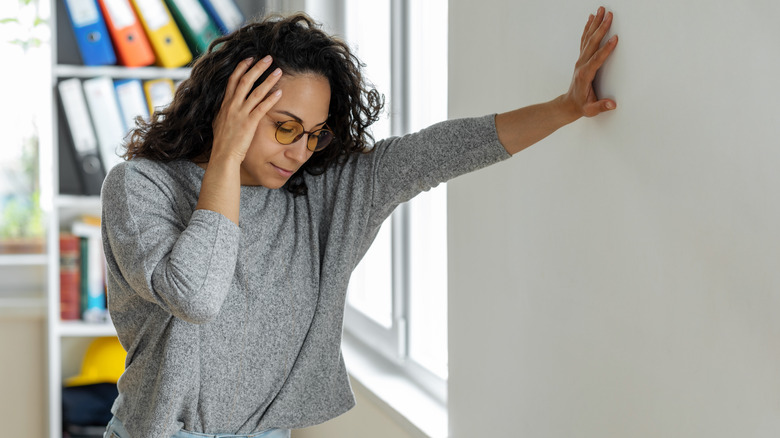Most times, you don’t think much about the simple act of yawning until someone sitting across from you opens their mouth in a big loud yawn and you follow suit. Yawns have perplexed scientists for quite some time. Some say we do it to cool our brains while others think we yawn when we’re bored, tired, or sleepy as a way to wake ourselves up. As for why yawning is contagious, like when you’re reading about yawning (you’re welcome) or see someone else yawn, it might have to do with something called social mirroring or empathy yawning.
But there are other, lesser-known and weird reasons why you might be yawning too — like when you’re feeling anxious. According to University of Maryland, Baltimore County, neuroscientist and author of “Curious Behavior: Yawning, Laughing, Hiccupping, and Beyond,” this seemingly out-of-context reaction from humans to anxiety could be related to something called displacement activity (via Wired).
Think of a cat that just almost got run over by a car that promptly sits itself down and starts grooming itself. Or a human who scratches their head when they’re confused. The action that follows the emotion seems irrelevant but could be bringing some soothing benefits to the doer. There’s another, more physiological, explanation for why we yawn when we’re anxious.
Anxiety makes us yawn because of hyperventilation

Anxiety-related yawning could also have to do with the hyperventilation that comes with feeling anxious (via Calm Clinic). Hyperventilation, otherwise known rapid or deep breathing because of some sort of stress response, can make you feel like you’re not getting enough oxygen into your lungs. Your body responds by yawning in the hopes of trying to soothe this sensation — because a yawn means taking a nice big breath of air to increase oxygen flow in your blood.
But it’s important to understand that what is in fact happening with hyperventilation is that you’re inhaling too much oxygen and letting out too much carbon dioxide, per Calm Clinic. So yawning excessively to try and regulate this imbalance, weirdly, might actually prove counter-productive.
What you should be doing instead is stop over-breathing (via Johns Hopkins Medicine). Over-breathing can make you feel breathless and make you hyperventilate more. Try and let your body breathe the way it’s supposed — nice, small, calm breaths — until you can regulate the excessive oxygen intake and carbon dioxide release. Now that you know the scientific explanation behind yawning when you’re anxious, here are some more tips to manage anxiety-induced hyperventilation.
How to handle hyperventilation

Anxious feelings are overwhelming in themselves without hyperventilation becoming a part of the problem, but this does happen sometimes. You might experience shortness of breath, dizziness, numbness and tingling in your arms, chest pain, and confusion too when you hyperventilate (via Johns Hopkins Medicine).
Learning to breathe properly is one of the main pieces of advice experts would give you. If your therapist has already gone over breathing exercises for when you start yawning during anxiety, follow those steps. If not, you can try breathing through pursed lips (via My Health Alberta). Actions like pursing your lips or even pinching one nostril while breathing force you to take in less air than you’re currently trying to take in.
Belly breathing is another method you can try. It can bring your body back from its stressed “fight or flight” response to a more natural and calm state. As explained by health psychologist, Dr. Julia Kogan (via Forbes), picture that you’re filling and deflating a balloon in your stomach while breathing in and out. With one hand on your chest and another on your belly, breathe in slowly through your nose for two counts and exhale slowly for three counts. While yawning when you’re tired or sleepy is nothing to be worried about, the same cannot be said for when you’re anxious, especially if it leads to more hyperventilation.
If you or someone you know needs help with mental health, please contact the Crisis Text Line by texting HOME to 741741, call the National Alliance on Mental Illness helpline at 1-800-950-NAMI (6264), or visit the National Institute of Mental Health website.




